Sony Music warns companies to stop training AI on its artists’ content

(Bloomberg) — Sony Music Group, one of the world’s biggest record labels, warned artificial intelligence companies and music streaming platforms not to use the company’s content without explicit permission.
Most Read from Bloomberg
US Inflation Data Was Accidentally Released 30 Minutes Early
With a BlackRock CEO, $9 Trillion Vanguard Braces for Turbulence
Putin and Xi Vow to Step Up Fight to Counter US ‘Containment’
Jamie Dimon Sees ‘Lot of Inflationary Forces in Front of Us’
China Unveils Broad Rescue Package to Prop Up Housing Market
Sony Music, whose artists include Lil Nas X and Celine Dion, sent letters to more than 700 companies in an effort to protect its intellectual property, which includes album cover art, metadata, musical compositions and lyrics, from being used for training AI models.
“Unauthorized use” of Sony Music Group content in the “training, development or commercialization of AI systems” deprives the company and its artists of control and compensation for those works, according to the letter, which was obtained by Bloomberg News.
Copyright infringement has become a major battleground issue for generative AI, which is being used to produce all kinds of content from text to images and video. While Hollywood actors and writers went on strike last year to protect their craft from AI, a new crop of startups is churning out entire albums of AI-generated music, heightening worries over artists’ livelihoods and rekindling tensions with streaming platforms.
Sony Music, along with the rest of the industry, is scrambling to balance the creative potential of the fast-moving technology while also protecting artists’ rights and its own profits.
“We support artists and songwriters taking the lead in embracing new technologies in support of their art,” Sony Music Group said in statement Thursday. “However, that innovation must ensure that songwriters’ and recording artists’ rights, including copyrights, are respected.”
Universal Music Group NV has been particularly outspoken over the past year-and-a-half, going so far as to take the “nuclear option” of pulling its entire catalog of music off of TikTok and suing AI startup Anthropic for publishing song lyrics without permission.
After months of stalemate, Universal ended its feud with ByteDance Ltd.’s TikTok earlier this month, with an agreement that secured a commitment from both parties to “work together to ensure AI development across the music industry will protect human artistry and the economics that flow to those artists and songwriters.”
In another sign of the growing conflict between creators and AI companies, synthetic speech startup Lovo Inc. was hit with a proposed class action lawsuit on Thursday alleging the company misappropriated actors’ voices and deceptively promoted its product as legally marketing their use. Two voiceover actors are seeking to represent people whose voice Lovo used without permission or compensation for “the purpose of creating or refining its AI text-to-speech generator” or whose AI-replicated voices were used or sold without proper compensation, according to a complaint filed in the US District Court for the Southern District of New York.
In many jurisdictions around the world, especially the European Union, copyright owners are encouraged to state publicly that their content isn’t to be used for data mining and AI training without specific licensing agreements.
In the US, the music industry has supported federal legislation in Congress that would protect artists’ voices and images from unauthorized AI use. In April, Warner Music Group Corp. Chief Executive Officer Robert Kyncl testified in front of a congressional subcommittee, stating his support for the “NO FAKES” Act.
“We must ensure a robust free-market licensing system to allow the use of copyright-protected materials for training AI models and strong legal protection for name, likeness and voice rights,” he said in prepared testimony.
Most Read from Bloomberg Businessweek
How the ‘Harvard of Trading’ Ruined Thousands of Young People’s Lives
Milei Targets Labor Law That’s Set to Hand Banker $10 Million Severance
©2024 Bloomberg L.P.

 Yahoo Finance
Yahoo Finance 